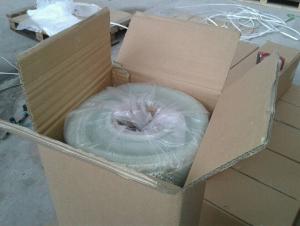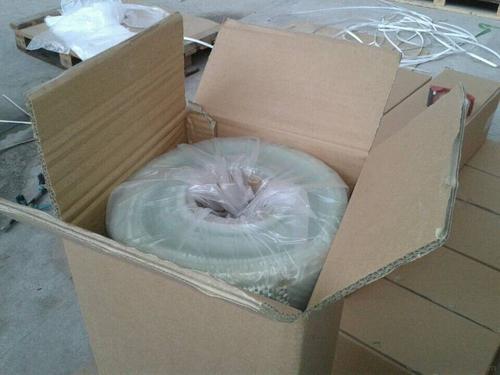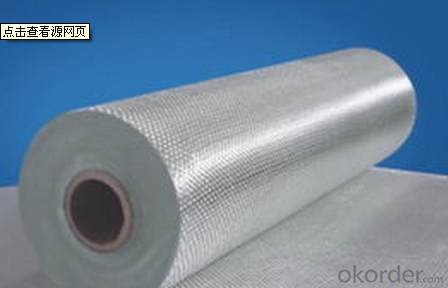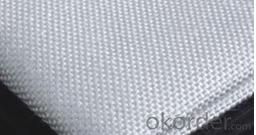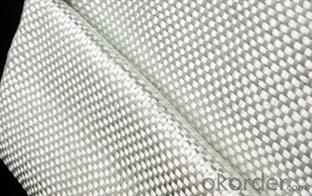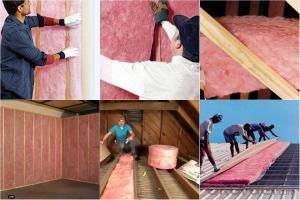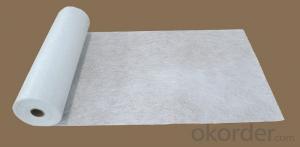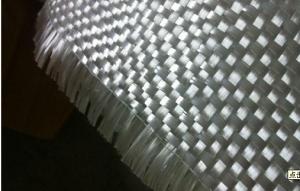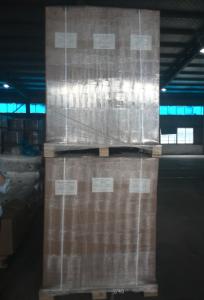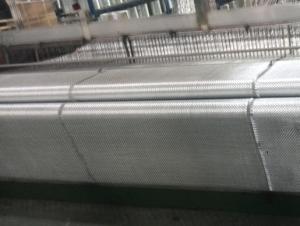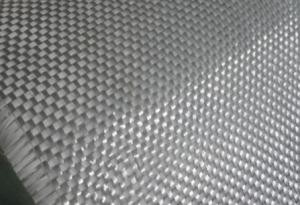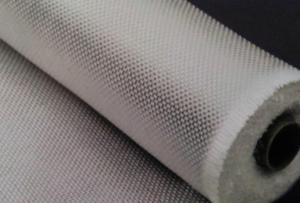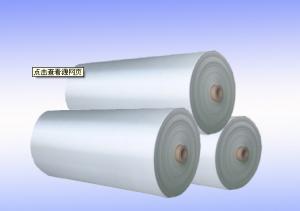Fiberglass Mat Tissue - E-Glass Fiberglass Woven Roving, 400g, 1200mm
- Loading Port:
- Shanghai
- Payment Terms:
- TT or LC
- Min Order Qty:
- 16000 kg
- Supply Capability:
- 160000 kg/month
OKorder Service Pledge
OKorder Financial Service
You Might Also Like
1.Brief Introduction
Glass woven rovings are bidirectional fabric by direct rovings in plain weave pattern. They are applicable for hand lay-up, winding and compress molding process, suitable for manufacturing tank, boat, automobile parts and other FRP products.
2.Main Features of the woven roving
1)Drapes well to suit the surface of intricate moulds
2)Fast wet-through and wet out
3)Easy handing and better appearance of the composite parts
3. Images
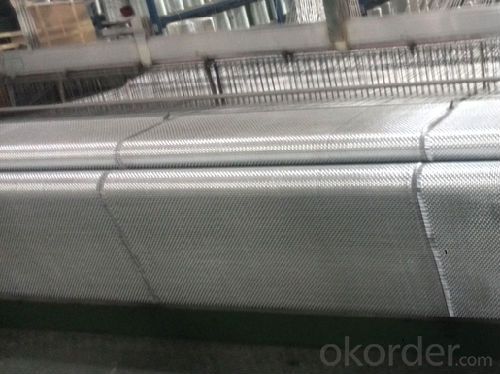
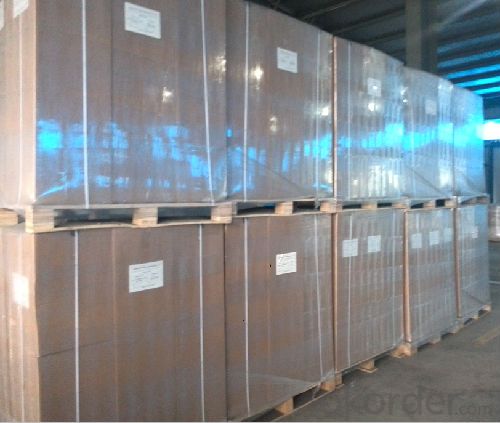
4.Woven roving Specification
Normal type | EWR800-1000 | Test Standard |
Apperance | Good | GB/T 18370-2001 |
Density(warpxweft)(end/cm) | 1.8 X 1.5 | GB/T 7689.2-2001 |
Tex (warpxweft) | 2400x2400 | ISO1889 |
Moisture content(%) | ≤0.10 | ISO3344 |
Loss on ignition(%) | 0.40-0.80 | ISO1887 |
Glass | E-glass | N/A |
5.FAQ of woven roving
Packaging:
Each woven roving is wound onto a paper tube which has an inside diameter of 76mm and the mat roll has a diameter of 220mm. The woven roving roll is wrapped up with plastic film,and then packed in a cardboard box or wrapped up with kraft paper. The rolls can be horizontally placed. For transportation, the rolls can be loaded into a cantainer directly or on pallets.
Storage:
Unless otherwise specified,It should be stored in a dry, cool and rain-proof area. It is recommended that the room temperature and humidity should be always maintained at 15℃~35℃ and 35%~65% respectively.
- Q: What is the typical thickness range of fiberglass mat tissue?
- The typical thickness range of fiberglass mat tissue can vary depending on the specific application and manufacturer. However, in general, fiberglass mat tissue is typically available in thicknesses ranging from 0.2 millimeters (mm) to 0.5 mm. This range allows for flexibility in selecting the appropriate thickness based on the desired strength, durability, and specific requirements of the intended use. It is important to note that these thicknesses may be subject to slight variations due to manufacturing processes and individual product specifications.
- Q: What are the different reinforcement densities available for fiberglass mat tissue?
- The reinforcement densities available for fiberglass mat tissue can vary depending on the specific application and manufacturer. Different densities, ranging from 15 gsm to 1000 gsm, are commonly used. For lightweight applications where strength and durability are not the primary concerns, lower density fiberglass mat tissue in the 15-50 gsm range is often utilized. These mats are commonly found in decorative surfaces, wallpaper, and lightweight insulation. Medium density fiberglass mat tissue, ranging from 50-300 gsm, offers a balance between strength and weight. This range is frequently used in industries such as construction, automotive, and marine. The medium density mats provide good reinforcement properties while remaining flexible and easy to handle. In heavy-duty applications that require high strength and superior durability, higher density fiberglass mat tissue, typically above 300 gsm, is employed. These mats are commonly used in roofing, flooring, and composite manufacturing. The higher density provides improved mechanical properties and ensures structural integrity. Ultimately, the choice of reinforcement density for fiberglass mat tissue depends on the specific requirements of the application, including desired strength, weight, and overall performance characteristics. It is advisable to consult with manufacturers and industry experts to determine the most suitable density for a particular use case.
- Q: Is fiberglass mat tissue resistant to fading?
- In general, fiberglass mat tissue tends to lack resistance against fading. Fading refers to the loss of original color or brightness in a material caused by exposure to sunlight or other environmental factors. Although fiberglass itself is known for its durability and ability to withstand weathering, the mat tissue used in fiberglass products often succumbs to fading over time. This can be attributed to both the binder or resin used to bind the fiberglass fibers together and the pigments or dyes used to color the tissue. When exposed to UV rays and other outdoor elements, these components can deteriorate and fade, resulting in a decrease in color intensity or brightness. Therefore, if maintaining the visual appeal of a fiberglass product is important, it may be necessary to take additional protective measures, such as applying a UV-resistant coating or using pigments specifically formulated for outdoor use.
- Q: What are the applications of fiberglass mat tissue?
- Fiberglass mat tissue is a versatile material that finds numerous applications across various industries. Some of the key applications of fiberglass mat tissue are: 1. Construction and Building Materials: Fiberglass mat tissue is widely used in the construction industry as a reinforcement material. It is commonly used in the manufacturing of roofing shingles, insulation materials, and wall coverings. The strong and durable nature of fiberglass mat tissue enhances the structural integrity of buildings and improves their resistance to external elements such as wind, moisture, and temperature changes. 2. Automotive Industry: Fiberglass mat tissue is extensively used in the automotive sector for manufacturing various components such as door panels, headliners, trunk liners, and interior trim parts. The lightweight and high strength properties of fiberglass mat tissue make it an ideal material for reducing the overall weight of vehicles while maintaining their structural integrity. 3. Marine Industry: Fiberglass mat tissue is widely used in the marine industry for the production of boat hulls, decks, and other structural components. The corrosion-resistant nature of fiberglass mat tissue makes it suitable for marine applications where exposure to water and harsh weather conditions is common. 4. Pipe Manufacturing: Fiberglass mat tissue is used in the production of fiberglass reinforced pipes. These pipes find applications in various industries such as oil and gas, chemical, and water management. The high strength and corrosion-resistant properties of fiberglass mat tissue make it an excellent choice for manufacturing pipes that can withstand high pressure and harsh chemical environments. 5. Filtration Systems: Fiberglass mat tissue is used in the production of air filters and liquid filtration systems. The fibrous structure of the material allows for efficient filtration by trapping dust particles, dirt, and other contaminants. This makes fiberglass mat tissue a preferred choice for applications requiring high-efficiency filtration, such as HVAC systems, industrial air filters, and water treatment plants. Overall, the applications of fiberglass mat tissue are vast and diverse, ranging from construction and automotive industries to marine and filtration systems. Its unique properties make it an invaluable material for enhancing structural integrity, reducing weight, and improving performance across various sectors.
- Q: Can fiberglass mat tissue be used for bridge construction?
- Yes, fiberglass mat tissue can be used for bridge construction. Fiberglass mat tissue is a versatile material that offers several advantages. It is lightweight yet strong, making it suitable for use in bridge construction where weight considerations are important. Additionally, fiberglass mat tissue is highly durable and resistant to corrosion, which is crucial for the longevity and maintenance of bridges. It can also be easily molded into various shapes, allowing for flexibility in bridge design. Moreover, fiberglass mat tissue has good impact resistance and excellent fatigue performance, ensuring the bridge's ability to withstand heavy loads and constant traffic. Overall, fiberglass mat tissue is a reliable and cost-effective material for bridge construction.
- Q: Does fiberglass mat tissue provide any UV resistance?
- Indeed, some degree of UV resistance is typically offered by fiberglass mat tissue. Comprised of glass fibers embedded in a resin matrix, this material provides a certain level of safeguard against UV radiation emitted by the sun. Nevertheless, it should be emphasized that the extent of UV resistance may differ based on the precise composition and manufacturing procedure of the fiberglass mat tissue. Furthermore, extended exposure to UV radiation can still result in gradual deterioration. Therefore, it is advisable to implement suitable measures, such as employing UV-resistant coatings or finishes, to augment the longevity and resilience of fiberglass mat tissue when utilized outdoors.
- Q: What is the thermal resistance of fiberglass mat tissue?
- The thermal resistance of fiberglass mat tissue typically ranges from 0.3 to 0.6 square meters Kelvin per watt (m²K/W), depending on the specific composition and thickness of the material.
- Q: Can fiberglass mat tissue be used for insulating ductwork?
- Yes, fiberglass mat tissue can be used for insulating ductwork. Fiberglass mat tissue is a type of insulation material that is made from fine glass fibers. It is a lightweight and flexible material that can be easily installed around ductwork to provide thermal insulation. Fiberglass mat tissue has excellent insulating properties and can help prevent heat loss or gain in ducts, improving energy efficiency. It also helps to reduce condensation and dampen noise transmission. Furthermore, fiberglass mat tissue is resistant to moisture, fire, and pests, making it a suitable choice for insulating ductwork in various environments.
- Q: Can fiberglass mat tissue be used for insulating crawl spaces?
- Yes, fiberglass mat tissue can be used for insulating crawl spaces. Fiberglass mat tissue is a versatile and commonly used material for insulation purposes. It is lightweight, flexible, and easy to install, making it suitable for crawl spaces which often have limited access and tight corners. Fiberglass mat tissue is also resistant to moisture, mold, and pests, making it an ideal choice for crawl spaces which are prone to these issues. Additionally, it provides excellent thermal insulation properties, helping to maintain a consistent temperature and energy efficiency within the crawl space. Overall, fiberglass mat tissue is a reliable and effective option for insulating crawl spaces.
- Q: What is the composition of fiberglass mat tissue?
- Fiberglass mat tissue is typically composed of fine strands of glass fibers that are woven or matted together to form a thin, flexible sheet. These glass fibers are made from molten glass that is drawn into thin filaments and then bundled together to create the desired thickness and density of the mat tissue. The glass fibers are often coated or treated with a binder material to enhance their strength and adhesion properties.
Send your message to us
Fiberglass Mat Tissue - E-Glass Fiberglass Woven Roving, 400g, 1200mm
- Loading Port:
- Shanghai
- Payment Terms:
- TT or LC
- Min Order Qty:
- 16000 kg
- Supply Capability:
- 160000 kg/month
OKorder Service Pledge
OKorder Financial Service
Similar products
Hot products
Hot Searches
Related keywords
